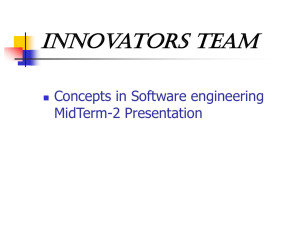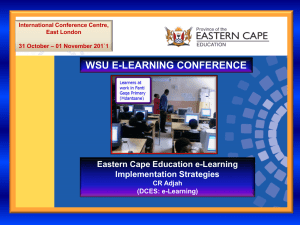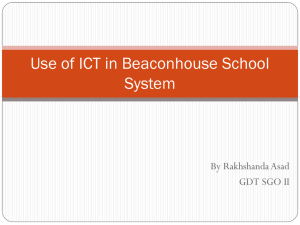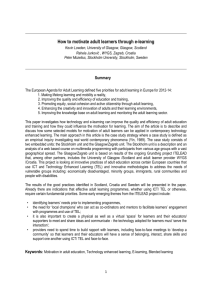READ MORE - Gauteng Online
advertisement
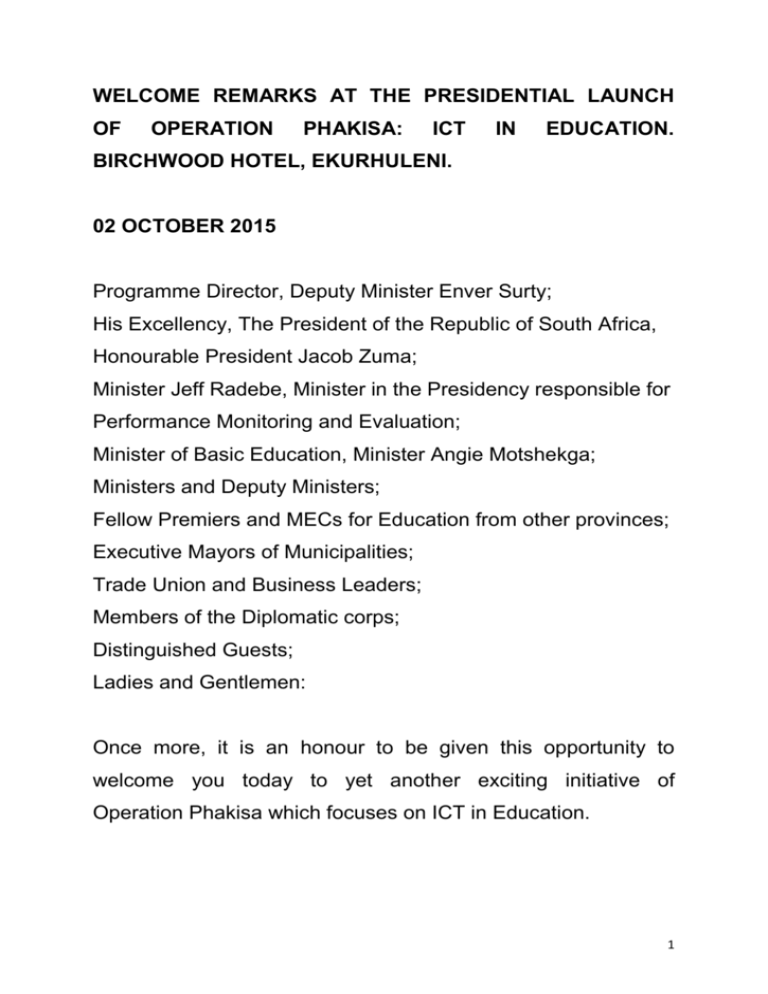
WELCOME REMARKS AT THE PRESIDENTIAL LAUNCH OF OPERATION PHAKISA: ICT IN EDUCATION. BIRCHWOOD HOTEL, EKURHULENI. 02 OCTOBER 2015 Programme Director, Deputy Minister Enver Surty; His Excellency, The President of the Republic of South Africa, Honourable President Jacob Zuma; Minister Jeff Radebe, Minister in the Presidency responsible for Performance Monitoring and Evaluation; Minister of Basic Education, Minister Angie Motshekga; Ministers and Deputy Ministers; Fellow Premiers and MECs for Education from other provinces; Executive Mayors of Municipalities; Trade Union and Business Leaders; Members of the Diplomatic corps; Distinguished Guests; Ladies and Gentlemen: Once more, it is an honour to be given this opportunity to welcome you today to yet another exciting initiative of Operation Phakisa which focuses on ICT in Education. 1 This follows the launch of Operation Phakisa in various sectors such as the Ocean Economy and the Ideal Clinic. Phakisa is becoming a daily reality of governing with urgency and purpose. Operation Phakisa is a ground-breaking initiative that gives effect to the call for radical social and economic transformation made by our President at the start of the Fifth Administration. This is one of the major steps being taken to implement the National Development Plan, Vision 2030. Mr President, in response to your call, we in Gauteng have adopted a Ten-pillar programme of radical Transformation, Modernisation and Re-industrialisation as a provincial plan to implement the NDP in the concrete conditions of our province. One of the pillars of our provincial plan is to modernise the way in which we deliver public services. In particular, we are rolling out e-government and e-services through the deployment ICT to enable government to serve the people better. In this regard, our provincial government is pioneering bold initiatives in e-learning, e-health, e-policing and e-government in general as part of our provincial plan to implement the NDP. 2 Today, we are very pleased that you are here Mr President, to launch Operation Phakisa focusing on ICT in Education. We are humbled that our province is one of key laboratories of Phakisa on technology-enabled education. We are a laboratory of a future ICT-enabled education. As you are aware, we have been in the forefront of the elearning revolution through what our MEC for Education has dubbed the “paperless classroom” and the “school of the future”. There are many lessons we have learnt in the process, with many challenges and exciting opportunities. I would to share with you some of the key lessons and challenges of this exciting journey into the future: On the positive side, many good signs of the benefits of ICT-enabled education are beginning to emerge: school attendance by both teachers and learners has improved where it was problematic and there is greater interest and excitement; teachers and learners come earlier and stay longer at school; dropout rate is declining and some learners are returning to schools; lots of self-training by teachers and self-teaching through access to web-based materials such as e-textbooks and e-novels; learners 3 are reporting that the tablets and connectivity helps them with access to best sources of information available globally, without the pain of going through libraries; Challenges: Improving infrastructure and look-and-feel in our schools, expanding connectivity, teacher training, security of the ICT infrastructure and the cost of the rollout are some of the major challenges. Implementation is the best way to learn and improve the plan. With humility, we hope the valuable lessons we bring will improve our chances of success in the nation-wide rollout of ICT in Education. However, there is no turning back on e-learning revolution. We can only expand the opportunities of e-learning to benefit all learners in our country, especially those in rural and township schools. For the first time, our children wake up looking forward to go to school. The morale is high among the teachers involved in this initiative. Welcome to the home of Homo naledi and welcome to the future! We are willing to be the laboratory where the experiment in e-learning is carried out in real time. 4 Are phakiseng! I thank you! 5

